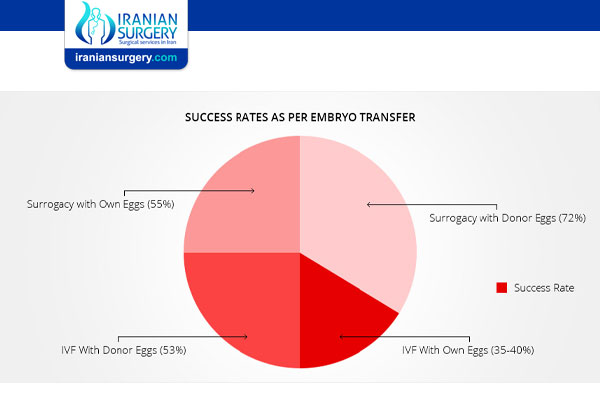What Is the Average Success or Failure Rate of Surrogacy?
What Is the Average Success or Failure Rate of Surrogacy?
Many couples are unable to conceive a baby or carry one to term and end up needing to find a surrogate mother instead. A surrogate carries another couple’s baby to term for varying compensation benefits. Due to this increasingly successful method of growing a family, many couples worry about surrogacy success rates. Families who are thinking about starting surrogacy want to know its success rate. Intended parents who already have had fertility treatments like in vitro fertilization (IVF) understand how important success rates can be. Surrogacy success rates are not as simple as the raw data suggests. Not only are there a myriad of factors to consider, but government agencies and clinics do not always report statistics consistently.
Average Surrogate Success Rates & Details
In the United States, the Centers for Disease Control and Prevention (CDC) calculates success rates for various fertility clinics and assisted reproductive technologies (ART). The CDC monitors ART using a system called the National Assisted Reproductive Technology Surveillance System, or NASS 2.0, for every cycle performed in the US. IVF clinics in the US have a surrogacy success rate of about 75% and Iran, with a growing number of fertility clinics, experts and specialists, is not that far behind.
Once the surrogate is pregnant, the success rate for a healthy birth is as high as 95%. Still, the Society for Assisted Reproductive Technology (SART) notes that “success varies with many factors.”
These results can differ somewhat if the surrogate becomes pregnant with more than one baby. A common procedure with standard IVF therapy is to retrieve enough eggs and sperm to create more than one embryo. Several embryos are typically transferred to the surrogate, and this process may result in a multiple birth pregnancy- this process is known as SET or DET (single embryo transfer or double embryo transfer). As a result, these statistics cannot be as accurate as experts would like.
Reasons for implanting more than one embryo at a time can include: a possibility of one or more of the embryos not implanting, treatment costs, and surrogate/intended mother stress of multiple transfer attempts. Multiple birth pregnancies by nature are always considered riskier for both the mother and the children. Most of our intended parents are encouraged to transfer one embryo as the likelihood of your surrogate mother having more than two babies is more prevalent and many surrogate mothers are nervous about transferring more than one embryo.
Even so, the statistics for successful pregnancies using a surrogate are considered high especially in Iran. Remember too that the number of these surrogate pregnancies are higher here in the states than in most other countries around the world. This can alter statistic facts.
Why are Pregnancies & Births Through Surrogates So Successful Overall?
It might appear a bit strange to have such high success rates with surrogate births, or surrogacy. However, there are some valid reasons for this. Some of these reasons follow:
. Access to better healthcare
. Typically overseen by fertility & obstetric specialists
. Surrogates often do not work outside jobs when pregnant. They are better able to rest & are healthier overall
. Surrogacy agencies (particularly in Iran) adhere to high standards
. Lower age requirements for surrogates
. Intense physical and psychological screenings by agencies that find surrogates
. Better general health needed to meet surrogate requirements
. Background checks required for surrogates and their loved ones who live with them
. More frequent testing & monitoring during pregnancy
Why Aren’t Available Surrogate Statistics More Recent?
Couples interested in investigating their surrogate options often can only find older statistics and other details on successful surrogate pregnancies and related information. There are a number of reasons for this.
Since surrogacy agencies as well as, fertility clinics are varied in their success and there are not the same qualifications for obtaining the statistics, the information can be varied as well. Only some fertility clinics release their successful statistic rates to the general public. As gestational surrogate carriers have become much more popular in just the past few years, laws and medical practices are constantly changing to keep up with the times.
About Iranian Surgery
Iranian surgery is an online medical tourism platform where you can find the best doctors and fertility specialists in Iran. The price of Surrogacy in Iran can vary according to each individual’s case and will be determined by an in-person assessment with the doctor.
For more information about the cost of Surrogacy in Iran and to schedule an appointment in advance, you can contact Iranian Surgery consultants via WhatsApp number 0098 901 929 0946. This service is completely free.
Source:
https://americanfertility.com/surrogacy-success-rate/
https://madeintheusasurrogacy.com/surrogacy-success-rates/


